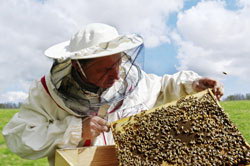Protecting European apiculture
The importance of apiculture goes far beyond the production of honey, royal jelly, pollen and wax. Bees play an important role as pollinators, central for plant reproduction and multiplication. However, bee health is threatened by viruses and, therefore, strategies for preventing bee viral infections are urgently needed. With this in mind, the EU-funded BRAVE project aimed to assess the risk of bee virus infection in European bee colonies. The BRAVE SSA focused on establishing collaboration among researchers and European advisors in order to facilitate knowledge and skills transfer. Through the organisation of scientific meetings, BRAVE aimed to gather scientific knowledge on virus diagnosis, genetics and epidemiology. This information would help assess the economic and ecological impact of virus diseases in bees and deal with regulatory issues for preventing the entry of exotic bee viruses into the EU. Additionally, project partners formulated policy advice to the European Commission regarding these issues and to the World Organisation for Animal Health (OIE) for diagnostic procedures. The proceedings and recommendations of the BRAVE project have been disseminated in a scientific journal and are essentially the first step towards a more effective approach for preventing and diagnosing bee viral diseases.







